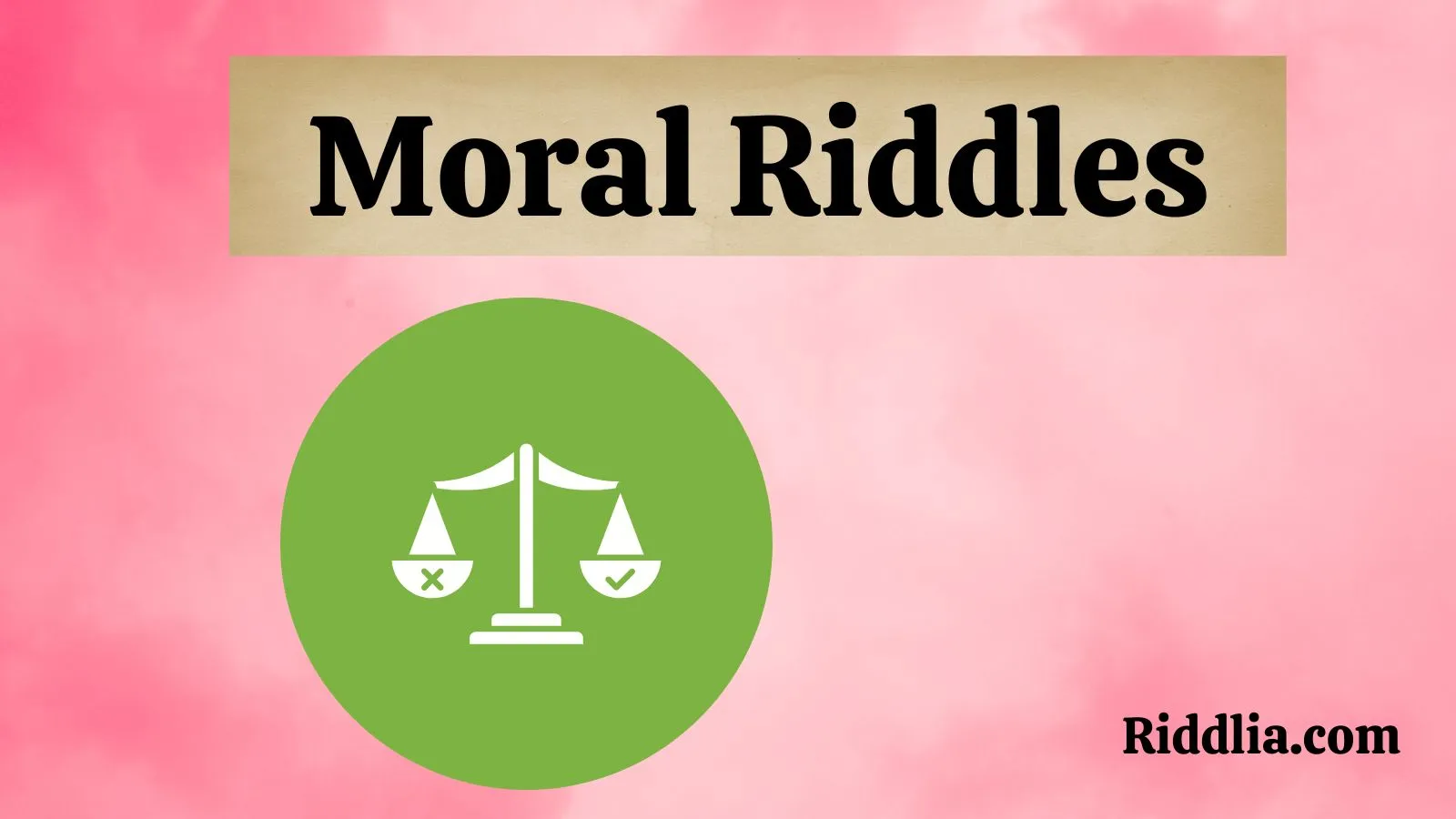🧩 Moral Riddles With Answers for 2025 – Test Your Mind and Heart 💡
Welcome to the world of Moral Riddles – where your mind and heart come together! In this article, you will find the latest, trending, and most creative moral riddles designed to challenge your thinking and spark some deep reflection. 🌟
These riddles are not only fun but also teach important lessons, making them perfect for both adults and kids. At the end of every riddle, you’ll find a Copy Button and Share to WhatsApp Button, so you can easily share your favorite riddles with friends and family. 5/5 experience guaranteed! ✅
Get ready to explore the moral riddles of 2025 – where every answer brings new insights! 🧠✨
1️⃣ Formal Alternatives to “Moral Riddles” 🏛️

For professional settings like business discussions, academic papers, or ethical debates, it’s best to use refined and sophisticated alternatives.
- Ethical Dilemmas – Used in discussions about ethics and decision-making.
- Example: “Let’s analyze these ethical dilemmas in our philosophy class.”
- Moral Conundrums – Sounds intellectual and is perfect for deep discussions.
- Example: “The novel presents fascinating moral conundrums about justice.”
- Philosophical Puzzles – Ideal for academic or intellectual discussions.
- Example: “Philosophical puzzles often challenge our core beliefs.”
- Ethical Puzzles – Great for legal, corporate, or academic contexts.
- Example: “Ethical puzzles arise when laws and morality conflict.”
- Values-Based Scenarios – A structured way to present moral challenges.
- Example: “Our leadership training includes values-based scenarios.”
- Moral Quandaries – Elegant and formal, used in literature and ethics.
- Example: “This case presents a moral quandary for the court.”
- Virtue-Based Dilemmas – Highlights questions of personal integrity.
- Example: “Virtue-based dilemmas help us define right and wrong.”
- Conscientious Challenges – Emphasizes personal responsibility.
- Example: “Doctors often face conscientious challenges in their work.”
- Ethical Thought Experiments – Popular in academic philosophy.
- Example: “The trolley problem is a famous ethical thought experiment.”
- Moral Paradoxes – Used for tricky ethical problems.
- Example: “Moral paradoxes reveal the complexities of human values.”
2️⃣ Casual Alternatives to “Moral Riddles” 😃

For everyday conversations, social media, or lighthearted discussions, it’s best to use simple and relatable wording.
- What Would You Do? – A natural way to ask about ethical choices.
- Example: “Imagine finding a lost wallet—what would you do?”
- Tough Choices – Sounds conversational and engaging.
- Example: “Here’s a tough choice: Would you lie to protect a friend?”
- Right or Wrong Scenarios – Simple and clear.
- Example: “Right or wrong: Keeping extra change from a cashier?”
- Mind-Bending Questions – Fun and engaging for casual settings.
- Example: “Here’s a mind-bending question: Is stealing ever okay?”
- Would You Rather (Ethical Edition) – Great for social media.
- Example: “Would you rather lie or break a promise?”
- Moral Brain Teasers – Perfect for friendly debates.
- Example: “Try this moral brain teaser: Would you save one person or five?”
- Tricky Ethics Questions – Keeps it light while being thought-provoking.
- Example: “This tricky ethics question will make you think!”
- Everyday Ethical Dilemmas – Relatable and down-to-earth.
- Example: “Everyday ethical dilemmas test our honesty and kindness.”
- Hard-to-Answer Questions – Emphasizes the difficulty of moral choices.
- Example: “This is one of those hard-to-answer questions about fairness.”
- Moral What-Ifs – Fun and engaging for casual conversations.
- Example: “Moral what-ifs make you rethink right and wrong!”
3️⃣ Polite and Respectful Alternatives 🌿

For situations where sensitivity is important, choose polite and respectful phrasing.
- Ethical Considerations – Respectful and open-ended.
- Example: “Let’s discuss the ethical considerations of this policy.”
- Moral Reflections – Encourages personal thinking.
- Example: “His speech sparked deep moral reflections.”
- Thought-Provoking Scenarios – Neutral and inviting.
- Example: “These thought-provoking scenarios challenge our beliefs.”
- Integrity Challenges – Focuses on honesty and values.
- Example: “Integrity challenges test our true character.”
- Fairness Tests – Highlights justice and equality.
- Example: “How we handle fairness tests shows our ethics.”
- Honesty Checkpoints – Simple and positive.
- Example: “These honesty checkpoints make us think before we act.”
- Kindness Dilemmas – Encourages compassion.
- Example: “Kindness dilemmas show our true priorities.”
- Respectful Moral Questions – Ensures politeness in sensitive discussions.
- Example: “Let’s discuss respectful moral questions together.”
- Life Lesson Puzzles – Frames morality in an uplifting way.
- Example: “Life lesson puzzles teach us about right and wrong.”
- Guiding Principles Scenarios – Highlights values.
- Example: “These guiding principles scenarios shape our decisions.”
4️⃣ 15 Texting Examples for Everyday Use 📱

Here are texting-friendly ways to phrase moral riddles:
- “What would you do if you found a lost wallet?”
- “Is it ever okay to lie? Why or why not?”
- “Would you help someone if no one was watching?”
- “Right or wrong: Keeping extra change from a store?”
- “What’s a tough moral choice you’ve faced?”
- “If honesty hurts someone, should you still tell the truth?”
- “Would you rather break a promise or tell a white lie?”
- “Is it stealing if you take food to feed a starving family?”
- “Can kindness ever be the wrong choice?”
- “What would you do if you saw someone cheating on a test?”
- “Would you return a wallet full of cash?”
- “Do the ends ever justify the means?”
- “If you saw a friend shoplifting, what would you do?”
- “Would you tell on a coworker who is lying?”
- “Is breaking a small rule okay if no one gets hurt?”
Conclusion 🎯
Choosing the right words matters. Whether you’re in a professional, casual, or polite setting, you now have 70+ alternatives to “moral riddles.” Each one fits a different tone and context, helping you communicate clearly and effectively.
Try using these alternatives in conversations, writing, or social media to make your messages more engaging and meaningful!

